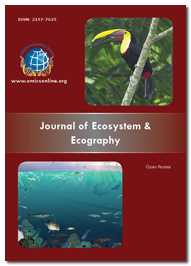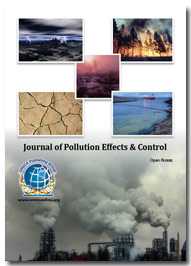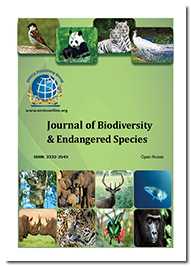Theme: Stimulate an Analysis on Conserving Biodiversity - ICBD
Biodiversity-2016
OMICS International Conferences invites all the participants from all over the world to attend '5th International Conference on Biodiversity' during March 10-12, 2016 in Madrid, Spain which includes prompt Keynote presentations, Oral talks, Poster presentations and Exhibitions.
Biodiversity 2016 is a global platform to discuss and learn about Ecology and its associated fields, Evolution of Species, Plant & Animal Biodiversity, Biodiversity Management, Fauna & Flora, Biodiversity & Food Security, Conservation of Endangered Species, Marine Biodiversity, Forestry and Sustainable Development.
Track 1: Biodiversity
Biodiversity refers to the variety of life. It is seen in the number of species in an ecosystem or on the entire Earth. Biodiversity gets used as a measure of the health of biological systems, and to see if there is a danger that too many species become extinct. The topics which we are going to discuss are Biodiversity and Evolution, Marine Biodiversity, Global Biodiversity, Sustainable Development, etc.
Our aim is to generate a new enthusiasm among the family of biodiversity through our Biodiversity Conferences & Sustainable Conferences.
Our "biodiversity event" focusing on biodiversity & its health.
Related Conferences: 5th International Conference on Earth Science & Climate Change July 25-27, 2016, Thailand; International Conference on Pollution Control & Sustainable Environment April 25-26, 2016, UAE; 4th International Conference on Oceanography & Marine Biology July 18-20, 2016, Australia; 2nd International Conference on Green Energy & Expo November 28-30, 2016, USA; 3rd International Conference on Food Security and Nutrition, March 23-25, 2016, Netherlands; 18th International Conference on Biodiversity and Ecosystems, March 30-31, 2016, Turkey; 18th International Conference on Global Food Security, March 1-2, 2016, Singapore; International Association for Food Protection Annual Meeting, July 1st- Aug 3rd, 2016, USA.
Track 2: Conservation
Biodiversity conservation is about saving life on Earth in all its forms and keeping natural ecosystems functioning and healthy. Life has existed on Earth for over 3.5 billion years. Over 95% of the species that ever existed have gone extinct. So why should we allow current extinction? And it’s a time to discuss on like Soil Conservation, Forest Conservation, Environmental Conservation, Land Conservation, Wildlife Conservation, Plant Conservation, etc.
Our past four Biodiversity Conferences were played a vital role in the conservation of endangered species.
Related Conferences: 4th International Conference on Oceanography & Marine Biology July 18-20, 2016, Australia; 5th International Conference on Earth Science & Climate Change July 25-27, 2016, Thailand; International Conference on Pollution Control & Sustainable Environment April 25-26, 2016, UAE; Prairie Conservation and Endangered Species Conference, Feb 16-18, 2016, Canada; Endangered Species Act Conference, Jan 21-22, 2016, USA; IUCN World Conservation Congress, Sep 1-10, 2016, USA; 18th International Conference on Wildlife Ecology, Rehabilitation and Conservation, March 14-15, 2016, France; International Conference on Island Evolution, Ecology, and Conservation, July 18-22, 2016, Portugal; Mares Conference, Feb 1-5, 2016, Portugal.
Track 3: Endangered Species
An Endangered Species is a species which has been categorized by the International Union for Conservation of Nature (IUCN) Red List as likely to become extinct. Endangered means, “still there is a time” to protect an extinction of endangered animals, endangered plants, endangered wetlands etc.
Our Biodiversity Conferences are providing a good platform for the organizations, which are working on endangered species.
Related Conferences: 4th International Conference on Oceanography & Marine Biology July 18-20, 2016, Australia; 5th International Conference on Earth Science & Climate Change July 25-27, 2016, Thailand; International Conference on Pollution Control & Sustainable Environment April 25-26, 2016, UAE; Prairie Conservation and Endangered Species Conference, Feb 16-18, 2016, Canada; Endangered Species Act Conference, Jan 21-22, 2016, USA; IUCN World Conservation Congress, Sep 1-10, 2016, USA; 18th International Conference on Wildlife Ecology, Rehabilitation and Conservation, March 14-15, 2016, France; International Conference on Island Evolution, Ecology, and Conservation, July 18-22, 2016, Portugal; Mares Conference, Feb 1-5, 2016, Portugal.
Track 4: Global Warming
Global Warming is the increase of Earth's average surface temperature due to effect of greenhouse gases, such as carbon dioxide emissions from burning fossil fuels or from deforestation, which trap heat that would otherwise escape from Earth. It causes severe climate change, which is affecting the habitats of several species, which must either adapt or migrate to areas with more favourable conditions. Even small changes in average temperatures can have a significant effect upon ecosystems.
Climate Change Conferences, Environmental Conferences & Sustainable Conferences are well organizing across the world to reduce the effect of Global Warming.
Related Conferences: 5th International Conference on Earth Science & Climate Change July 25-27, 2016, Thailand; International Conference on Pollution Control & Sustainable Environment April 25-26, 2016, UAE; 4th International Conference on Oceanography & Marine Biology July 18-20, 2016, Australia; 2nd International Conference on Green Energy & Expo November 28-30, 2016, USA; National Conference on Climate Change, Biodiversity and Sustainable Capacity Building, March 2016, India; 4th International Climate Change Adaptation Conference, May 10-13, 2016, The Netherlands; 18th International Conference on Environment and Climate Change, Jan 12-13, 2016, Switzerland; 5th International Conference on Climate Change and Humanity, Jan 23-25, 2016, Thailand; Loyola University Chicago’s Third Annual Climate Change Conference, March 17-19, 2016, USA.
Track 5: Threats to Biodiversity
Biodiversity is under serious threat as a result of human activities. The main dangers worldwide are population growth and resource consumption, climate change and global warming, habitat conversion and urbanisation, invasive alien species, over-exploitation of natural resources and environmental degradation. The main factor currently driving biodiversity loss is habitat destruction—on land; in streams, rivers, and lakes; and in the oceans. Human activities such as: deforestation; bottom trawling in the oceans; the damming and dredging of streams, rivers, and lakes; and the draining and degradation of wetlands, estuaries, and mangroves are responsible.
The main threats to our Biodiversity are Environmental Pollution & Climate Change, so we took a chance to eradicate the word threat to Biodiversity by our Environmental Conferences, Climate Change Conferences & Sustainable Conferences.
Related Conferences: 5th International Ecosummit Ecological Sustainability Engineering Change, Aug 29th-Sep 1st, 2016, France; 5th International Conference on Earth Science & Climate Change July 25-27, 2016, Thailand; 2nd International Conference on Green Energy & Expo November 28-30, 2016, USA; International Conference on Pollution Control & Sustainable Environment April 25-26, 2016, UAE; International Conference on Coastal Zones May 16-18, 2016, Japan; 2nd World Congress and Expo on Recycling July 25-27, 2016, Germany; 18th International Conference on Biodiversity and Agricultural Genetic Engineering, March 1-2, 2016, USA; 6th International Conference on Future Environment and Energy, January 23-25, 2016, Thailand; GGBN Second International Conference on Biodiversity Biobanking, June 21-24, Germany; 3rd International Conference on Civil, Biological and Environmental Engineering, Feb 4-5, 2016, Indonesia.
Track 6: Biodiversity and Ecosystem
Ecosystem functioning reflects the collective life activities of plants, animals, and microbes and the effects these activities feeding, growing, moving, excreting waste, etc. have on the physical and chemical conditions of their environment. (Note that functioning means showing activity and does not imply that organisms perform purposeful roles in ecosystem-level processes.) A functioning ecosystem is one that exhibits biological and chemical activities characteristic for its type. Ecologists abstract the essential features of an ecosystem into two compartments, the biotic and the abiotic. The biotic compartment consists of the community of species, which can be divided functionally into plant producers, the consumers that feed on producers and on each other, and the decomposers. The abiotic compartment consists of organic and inorganic nutrient pools. Energy and materials move between these two compartments, as well as into and out of the system. Comparing different ecosystems is likely to yield an unclear result because the response to variations in biodiversity cannot easily be distinguished from responses caused by variations in environmental and other factors. [biodiversity conferences USA] explained very well about Sustainable Development and Biodiversity & Ecosystem.
Related Conferences: 5th International Conference on Earth Science & Climate Change July 25-27, 2016, Thailand; 2nd International Conference on Green Energy & Expo November 28-30, 2016, USA; International Conference on Pollution Control & Sustainable Environment April 25-26, 2016, UAE; 4th International Conference on Oceanography & Marine Biology July 18-20, 2016, Australia; The 2nd Conference on Biodiversity and Ecosystem, June 1-3, 2016, China; Conference on Biodiversity and Ecosystems, June 1-3, 2016, Austria; 18th International Conference on Biodiversity and Ecosystems, March 30-31, 2016, Turkey; GEO BON Open Science Conference: Biodiversity and Ecosystems, July 4-9, 2016, Germany; The International Society for Ecological Modelling Global Conference, May 8-12, 2016, USA.
Track 7: Biodiversity and Sustainable Development
Living within our environmental limits is one of the central principles of sustainable development. One implication of not doing so is climate change. Environmental sustainable development involves making decisions and taking action that are in the interests of protecting the natural world, with particular emphasis on preserving the capability of the environment to support human life. Environmental sustainable development is about making responsible decisions that will reduce your business' negative impact on the environment. It is not simply about reducing the amount of waste you produce or using less energy, but is concerned with developing processes that will lead to businesses becoming completely sustainable in the future. Monitoring, analysis and management of environmental pollution in biodiversity Monitoring analysis and Assessment discusses technical developments and data arising from environmental monitoring and assessment, principles in the design of monitoring systems, and the use of monitoring data in assessing the consequences of natural resource management and pollution risks. Monitoring analysis designed to estimate exposure both at the individual and population levels, and also focuses on the development of monitoring systems related to the management of various renewable natural resources in, for instance, environment ,agriculture, fisheries and forests.
Our "biodiversity conferences" and "Sustainable Conferences" is providing a platform to speak on environmental issues.
Related Conferences: 5th International Conference on Earth Science & Climate Change July 25-27, 2016, Thailand; 2nd International Conference on Green Energy & Expo November 28-30, 2016, USA; International Conference on Pollution Control & Sustainable Environment April 25-26, 2016, UAE; 4th International Conference on Oceanography & Marine Biology July 18-20, 2016, Australia; 18th International Conference on Energy, Environment and Sustainable Development, Jan 21-22, 2016, France; 8th International Conference on Sustainable Development and Planning, Dec 6-8, 2016, Malaysia; 22nd International Sustainable Development Research Society Conference, July 13-15, 2016, Portugal; Sustainable Energy & Technology Asia, March 23-25, 2016, Thailand; International Conference on Renewable Energy and Smart Grid, March 20-22, 2016, Thailand.
Track 8: Biodiversity Models and Conservation Methods
Conservation methods and biodiversity models are meant to protect our environmental belongings from extinction. Two of the methods of conservation are In situ conservation, which means conservation of species in their natural habitat or natural ecosystem and Ex situ conservation, which means conservation involves maintenance and breeding of endangered species in specific areas under controlled condition.
Environmental Conferences, Climate Change Conferences and Sustainable Conferences are the basic pillars to generate new methods and models for the conservation of Biodiversity.
Related Conferences: 5th International Ecosummit Ecological Sustainability Engineering Change, Aug 29th-Sep 1st, 2016, France; 5th International Conference on Earth Science & Climate Change July 25-27, 2016, Thailand; 2nd International Conference on Green Energy & Expo November 28-30, 2016, USA; International Conference on Pollution Control & Sustainable Environment April 25-26, 2016, UAE; International Conference on Coastal Zones May 16-18, 2016, Japan; 2nd World Congress and Expo on Recycling July 25-27, 2016, Germany; 18th International Conference on Biodiversity and Agricultural Genetic Engineering, March 1-2, 2016, USA; 6th International Conference on Future Environment and Energy, January 23-25, 2016, Thailand; GGBN Second International Conference on Biodiversity Biobanking, June 21-24, Germany; 3rd International Conference on Civil, Biological and Environmental Engineering, Feb 4-5, 2016, Indonesia.
Track 9: Forestry
Forestry is the science and craft of creating, managing, using, conserving, and repairing forests and associated resources to meet desired goals, needs, and values for human benefit. Forestry is practiced in plantations and natural stands. The challenge of forestry is to create systems that are socially accepted while sustaining the resource and any other resources that might be affected. The forest science has elements that belong to the biological, physical, social, political and managerial sciences.
Conservation, The area of flora, fauna and biodiversity is quite interrelated. Flora and fauna forms a major part of biodiversity. India is a land of varied flora, fauna and biodiversity. India is one of the twelve mega-diverse nations of the World. Two of India's great mountain ranges, the Eastern Himalayas and the Western Ghats have been designated among the world's eighteen 'hotspots' of biodiversity. But In the last few decades we have seen a steady increase in the extinction rate of flora, fauna etc. all over world including India and so now, conservation of biological diversity is of paramount importance to the survival of man. Conservation of biological diversity leads to conservation of essential ecological diversity to preserve the continuity of food chains. The genetic diversity of plants and animals is preserved. It ensures the sustainable utilization of life support systems on earth. It provides a vast knowledge of potential use to the scientific community. A reservoir of wild animals and plants is preserved, thus enabling them to be introduced, if need be, in the surrounding areas. Biological diversity provides immediate benefits to the society such as recreation and tourism. Biodiversity conservation serves as an insurance policy for the future.
The major role of Forest in our ecosystem was explained at biodiversity conferences 2015
Related Conferences: 3rd Annual International Conference on Agriculture and Forestry, June 1-3, 2016, Philippines; International Society of Tropical Foresters, Yale University, Jan 28-30, 2016, USA; 5th International Conference on Earth Science & Climate Change July 25-27, 2016, Thailand; International Conference on Pollution Control & Sustainable Environment April 25-26, 2016, UAE; 4th International Conference on Oceanography & Marine Biology July 18-20, 2016, Australia; 2nd International Conference on Green Energy & Expo November 28-30, 2016, USA; COFO 23, Committee on Forestry, July 18-22, 2016, Italy; North American Forest Commission - 28th Session, Jan 11-15, 2016- USA; Forests Ontario Conference, 5th Feb, 2016, Canada.
Track 10: Biodiversity and Food Security
Across scales from genes to species, landscapes and biomes, biodiversity is an important resource for humanity. It is the key for a broad range of services provided by ecosystems. Biodiversity helps regulate the nutrient cycle, water (e.g. floods) and mitigates impacts of climate change. Biodiversity is also of direct importance for human well-being and for cultural and other values including recreation. The provisioning of clean water and diverse food supply makes it vital for all people.
Food security faces significant challenges due to population growth, poverty, globalization, climate change and other factors. Supplying healthy food to all citizens is crucial for global development - to reach it, not only food production but also equitable access to food for all people must be improved substantially. Biodiversity loss and global food security are hence two major challenges of our time. Linking these two areas from a research perspective, and seeking synergies between them is likely to generate multiple benefits for social, ecological and economic development.
Our "biodiversity event" focusing on Biodiversity & Food Security.
Related Conferences: 5th International Conference on Earth Science & Climate Change July 25-27, 2016, Thailand; International Conference on Pollution Control & Sustainable Environment April 25-26, 2016, UAE; 4th International Conference on Oceanography & Marine Biology July 18-20, 2016, Australia; 2nd International Conference on Green Energy & Expo November 28-30, 2016, USA; 3rd International Conference on Food Security and Nutrition, March 23-25, 2016, Netherlands; 18th International Conference on Biodiversity and Ecosystems, March 30-31, 2016, Turkey; 18th International Conference on Global Food Security, March 1-2, 2016, Singapore; International Association for Food Protection Annual Meeting, July 1st- Aug 3rd, 2016, USA.
Track 11: Biodiversity Market
Biodiversity markets are a group of avoidance & compensation mechanisms designed to mitigate for impacts on biodiversity. These mechanism finance conservation and restoration that deliver environmental benefits comparable to or “above and beyond” the biodiversity footprint made. Typically, this mitigation is driven by a policy goal of “no net loss” of species, habitat, and cultural and human use values.
Related Conferences: 5th International Conference on Earth Science & Climate Change July 25-27, 2016, Thailand; International Conference on Pollution Control & Sustainable Environment April 25-26, 2016, UAE; 4th International Conference on Oceanography & Marine Biology July 18-20, 2016, Australia; 2nd International Conference on Green Energy & Expo November 28-30, 2016, USA; Praire Conservation and Endangered Species Conference, Feb 16-18, 2016, Canada; Monitoring Ecological Restoration Conference, April 2-6, 2016, USA; National Mitigation & Ecosystem Banking Conference, May 10-13, 2016, USA; Society of Wetland Scientists Annual Meeting, May 31- June 4, 2016, USA; EcoSummit, Aug 29-Sep 1, 2016, France; INTECOL International Wetlands Conference, Sep 16-24, 2016, China; IUCN World Conservation Congress, Sep 1-10, 2016, USA.
OMICS International Conferences invites all the participants from all over the world to attend '5th International Conference on Biodiversity' during March 10-12, 2016 in Madrid, Spain which includes prompt Keynote presentations, Oral talks, Poster presentations and Exhibitions.
Biodiversity 2016 is a global platform to discuss and learn about Ecology and its associated fields, Evolution of Species, Plant & Animal Biodiversity, Biodiversity Management, Fauna & Flora, Biodiversity & Food Security, Conservation of Endangered Species, Marine Biodiversity, Forestry and Sustainable Energy Development.
OMICS International Organizes 1000+ Global Events inclusive of 300+ International Conferences, 500+ Workshops and 200+ Symposiums every year across USA- Europe & Asia with support from 1000 more scientific societies and publishes 400+ Open access journals which contains over 30000 eminent personalities, reputed scientists as editorial board members.
Why to attend?
People from around the world are looking forward to build an Eco-friendly world and they are doing well with their research on different kind of species and how they evolved and diversified among the world and some of them were extinct and some of them are ready to extinct, which makes researchers to think and take care on conservation of endangered species. So we take an initiation to gather researchers from around the world at a single stage to discuss on the diversity of species and it’s relation with surrounding environment and also makes a strategy to conserve endangered species. We assure 5th International Conference on Biodiversity is going to build a new enthusiasm among the people on importance of Biodiversity.
Target Audience:
· Ecologists
· Environmental Scientists
· Biologists
· Geologists
· Forestry Scientists
· Marine Scientists
· Fresh Water scientists
· Archaeologists
· Conservation Scientists
Summary of Biodiversity Conference:
Biodiversity conference is playing an important role to create awareness among an individual’s about how different types of species are surviving in our ecology and about its evolution and how to be eco-friendly. World is looking at extinction of species, so we organize biodiversity conference which mainly aims to eradicate the extinction of endangered species. We are inviting whole world to gather at a single platform and to raise-up their voice on “Conservation of Endangered Species”.
Scope and Importance of Biodiversity Research:
The study and research on biodiversity is unlimited. The scope of biodiversity includes, ecology, evolution, marine science, animal science, plant science, landscape, environmental science, geology, forestry, sustainable energy etc.. The scope of the meeting is to brought ecologists and population biologists to evaluate the consequences of human-driven disruption of natural system.
The importance of biodiversity research is to evaluate the different kinds of species among our biosphere and also helps to find new ways for the conversation of endangered species. Up to know we have several types of species in our ecology and the research which is going-on will give much more varieties of species and it’s evolution as well.
Why it’s in Madrid, Spain:
Madrid is the largest and capital city of Spain and which it was surrounded with many universities, association & societies and government bodies which were focusing mainly on research on biodiversity. The Spanish National Research Council (Spanish: Consejo Superior de Investigaciones Científicas, CSIC) is the largest public institution dedicated to research in Spain and the third largest in Europe. Its main objective is to develop and promote research that will help bring about scientific and technological progress, and it is prepared to collaborate with Spanish and foreign entities in order to achieve this aim. CSIC plays an important role in scientific and technological policy, since it encompasses an area that takes in everything from basic research to the transfer of knowledge to the productive sector. Its research is driven by its centers and institutes, which are spread across all the autonomous regions. CSIC has 6% of all the staff dedicated to Research and Development in Spain, and they generate approximately 20% of all scientific production in the country. We based up on the research quote “Wetlands are considered vulnerable ecosystems of both high species richness and socio-economic value. In semi-arid regions, these ecosystems often experience long drought periods that are usually aggravated by local water overexploitation”, which was obtained from Spanish National Research Council. As per the research it has been demonstrated that plankton can be very useful for tracking environmental changes of wetlands, thus giving the environmental manager another tool to enhance the conversation of wetlands and their biota. So we keen to join with the research which is going-on at Madrid and to raise the research value by hosting our conference.
Members Associated with Biodiversity Research:
Overall 8 university people are working on biodiversity along with many individual institutes, associations & societies, museum and government bodies, in that most of them are professors, post-doc’s, PhD students along with individual scientists and also some of the museums are joining their hand in the field of biodiversity research.
- City Statistics:
- Country Statistics:
- Worldwide statistics
Societies Associated with Biodiversity Research:
Societies belongs to Madrid, are involving to raise the research value of Biodiversity, which are listed below
- Social-ecological systems Laboratory
- Program on Ecosystem Change and Society
- The Kids Ecology Corps
- Institute for Social Ecology
- Liaison Unit Madrid-FOREST EUROPE
- International Commission for the conservation of atlantic tunas
- Natural Resources Defence council
- Seas at Risk
- Fundación Global Nature
- CERO project of endangered species
- Real Jardin Botanico
- BEATY Biodiversity Museum
- LYCHNOS
Universities Associated with Biodiversity Research
Madrid is surrounded with an eminent Universities and in which biodiversity research is growing abundantly. Below listed universities, belongs to Madrid, Spain. Most of the universities which are listed above are creating awareness among the students on biodiversity and about eco-friendly.
- Menendez Pelayo International University
- Autonomous University of Madrid
- Carlos III University of Madrid
- Complutense University of Madrid
- National University of Distance Education
- Technical University of Madrid
- CEU San Pablo University
- European University of Madrid
- Comillas Pontifical University
- Distance University of Madrid
Market Value on Biodiversity Research
Spain government is allowing budget on biodiversity research, which distributes to central government, state government, local government & business sector as well and the total expenditure is 1,640.82 UDS million in the year 2015 and the country trying to spend 0.7% of Gross National Income.
Market Growth of Biodiversity Research in the last and upcoming ten years
World is looking at endangered species and try to eradicate the extinction and vanishing of species, so UNO is providing much more investments to do much better than previous era. Only for a single year its’ cost US$ 4 billion and by concerning all the related areas of biodiversity spending $76 billion a year. The researchers concluded that improving the status of all the world’s 1,115 threatened bird species would cost between $875 million and $1.23 billion a year for the next decade. Adding in other animals raises the number to between $3.41 billion and $4.76 billion a year.
Funding Opportunities:
Many funding agencies or organizations are providing funds for the researchers to complete their projects. Examples like Society for Conservation Biology is allotting US$ 500 to US$700 and U.S Fish and Wildlife Service providing US$10 thousand to US$200 and organization like Grants to Project Birds to Prey is funding with US$ 5 thousand Field Museum Organization is providing scholarships for graduate fellowships and American Society of Primatologists is funding US$ 2 thousand and Oklahoma City Zoo & Botanical Garden is allotting US$2, 500 as a Conservation Grant for the year of 2015.
Refernces:
http://www.terravivagrants.org/Home/funding-news/biodiversity-conservation-wildlife
https://books.google.co.in/books?id=CgTkBgAAQBAJ&pg=PA159&lpg=PA159&dq=2015+expenditure+on+Biodiversity+by+spain&source=bl&ots=RLaYL61fsh&sig=lf_VQ3UAVoWoQ45Gv9f9te95G64&hl=en&sa=X&ei=MHmeVYDOJI2KuASh34fADA&ved=0CB0Q6AEwAA#v=onepage&q&f=false
http://crecimientoverde.fundacion-biodiversidad.es/sites/default/files/oecd_environmental_performance_reviews_spain.pdf
https://en.wikipedia.org/wiki/List_of_universities_in_Spain
http://www.business-biodiversity.eu/default.asp?Menue=92
http://www.seas-at-risk.org/
http://www.nrdc.org/
http://www.ecosystemmarketplace.com/marketwatch/


Raise Voice for Biodiversity
Welcome to all those that are engaged in the knowledge and in the conservation of nature and biodiversity. In a very fast changing world due to the severe human alterations, it is necessary to join collaborative and strong efforts to mitigate environmental problems and to keep ecosystems at equilibrium.
Welcome to the 5th International Conference on Biodiversity at Madrid, Spain March 10-12, 2016. Come and join to raise voice for biodiversity.

Professor. Carlos Frederico D. Rocha, PhD
Department of Ecology, Institute of Biology
Universidade do estado do Rio de Janeiro, Rio de Janeiro, Brazil


Dear Colleagues,
On behalf of the Organizing Committee, it is my great honour and pleasure to invite you to participate in the 5th International Conference on Biodiversity to be held in Madrid, Spain, on 10 – 12nd March.
Biodiversity 2016 is a global platform to discuss and learn about Ecology and its associated fields, Evolution of Species, Plant & Animal Biodiversity, Biodiversity Management, Fauna & Flora, Biodiversity & Food Security, Conservation of Endangered Species, Marine Biodiversity, Forestry and Sustainable Energy Development.
One of our aim is generate new investigations and collaboration between scientists. We also are very interested to welcome students and postdoctoral researchers in order to provide them the opportunity to show their investigations about Biodiversity
At this conference more than 30 experts from around the world will show us the main progress in trends of Biodiversity; Conservation; endangered Species; Global Warming; Biodiversity and Ecosystem; Biodiversity and Sustainable Development; Biodiversity models and conservation Methods; Forestry; Biodiversity and food security and Biodiversity market.
We hope that these conferences will be productive and satisfying. Personally, I hope that you have a very enjoyable and entertaining stay here, in Madrid.

Fdo: Prof. Dr. Pablo Refoyo Román
To share your views and research, please click here to register for the Conference.
To Collaborate Scientific Professionals around the World
| Conference Date | March 10-12, 2016 | ||
| Sponsors & Exhibitors |
|
||
| Speaker Opportunity Closed | Day 1 | Day 2 | Day 3 |
| Poster Opportunity Closed | Click Here to View | ||
Useful Links
Special Issues
All accepted abstracts will be published in respective Our International Journals.
- Journal of Ecosystem & Ecography
- Journal of Biodiversity & Endangered Species
- Journal of Pollution Effects & Control
Abstracts will be provided with Digital Object Identifier by






















